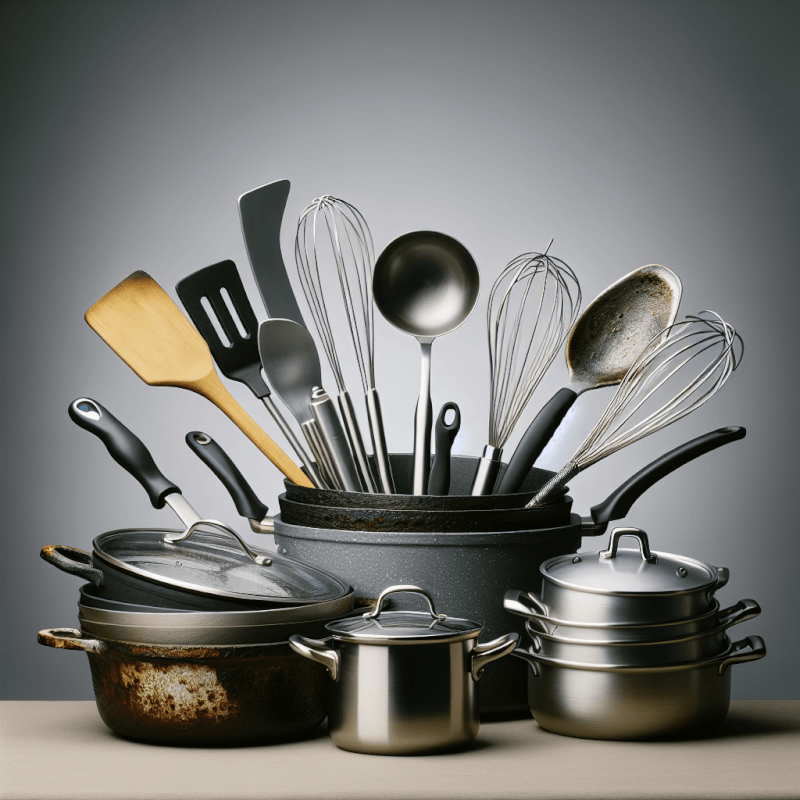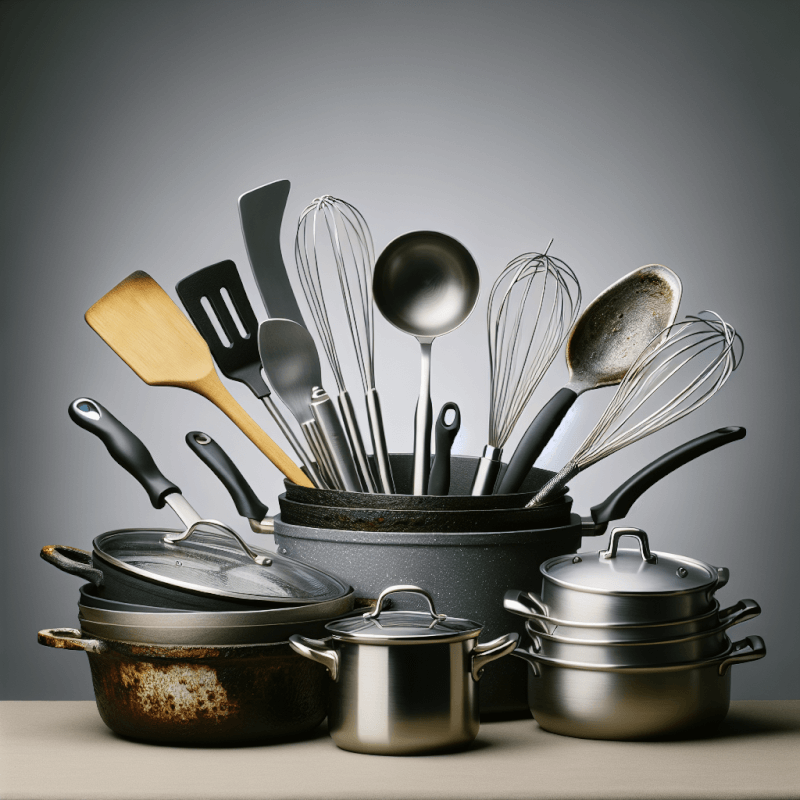When it comes to cooking, using the right utensils can make a big difference. But can you use metal utensils with all types of cookware? The answer, my friend, is not as simple as a yes or no. While some types of cookware can handle the robustness of metal utensils, others may not be as forgiving. In this article, we will explore the compatibility of metal utensils with various types of cookware and provide you with some handy tips to ensure your pots and pans remain in pristine condition. So, before you reach for that metal spatula, let’s find out if it’s a match made in culinary heaven or a recipe for disaster.
Overview
When it comes to cooking, the right cookware and utensils can make all the difference. But have you ever wondered if it’s safe to use metal utensils with all types of cookware? In this comprehensive article, we will explore the various types of cookware and their compatibility with metal utensils. We will also discuss the pros and cons of using metal utensils, recommend the best utensils for each cookware type, explore alternative utensil options, delve into the importance of utensil care, provide tips for prolonging cookware lifespan, and highlight common mistakes to avoid. By the end of this article, you will have a thorough understanding of how to use metal utensils safely while maximizing the lifespan of your cookware.
Understanding Cookware Types
Before we can determine whether it is safe to use metal utensils with all types of cookware, let’s first explore the different cookware materials available.
Non-Stick Cookware
Non-stick cookware is designed to prevent food from sticking to its surface, making cooking and cleaning a breeze. It typically has a non-stick coating made of materials like polytetrafluoroethylene (PTFE) or ceramic. While non-stick cookware is convenient, it requires careful handling to maintain its coating.
Stainless Steel Cookware
Stainless steel cookware is renowned for its durability and versatility. It is resistant to rust, corrosion, and staining, making it a popular choice among many home cooks and professional chefs. Stainless steel cookware can handle high heat and is compatible with most types of utensils.
Cast Iron Cookware
Cast iron cookware is known for its excellent heat retention and even heat distribution. It develops a natural non-stick surface when properly seasoned, making it great for searing and frying. However, cast iron cookware is prone to rust and requires a bit more maintenance than other types.
Copper Cookware
Copper cookware offers excellent heat conductivity, allowing for precise temperature control. It is often lined with stainless steel or tin to prevent any reaction between copper and food. While copper cookware is aesthetically appealing, it requires regular polishing to maintain its shine.
Aluminum Cookware
Aluminum cookware is lightweight and provides excellent heat conductivity. However, raw aluminum can react with certain acidic or alkaline foods, causing a metallic taste. To address this issue, most aluminum cookware is now coated with a protective layer.
Pros and Cons of Using Metal Utensils
Now that we have a basic understanding of the different cookware types, let’s explore the advantages and disadvantages of using metal utensils.
Advantages of Metal Utensils
Metal utensils, such as stainless steel or silicone-coated options, offer several benefits. They are sturdy and durable, allowing you to exert more pressure while cooking. Metal utensils also conduct heat effectively, which can be beneficial for certain cooking techniques. Additionally, metal utensils are usually dishwasher safe, making cleanup a breeze.
Disadvantages of Metal Utensils
While metal utensils are versatile and durable, they may not be suitable for all types of cookware. Metal utensils can scratch or damage the non-stick coating of non-stick cookware. They can also cause scratching or scarring on copper or stainless steel surfaces. Furthermore, using metal utensils on delicate cookware, such as ceramic or glass, can increase the risk of chipping or cracking.
Best Utensils for Each Cookware Type
To ensure the longevity of both your cookware and utensils, it is essential to use the most appropriate utensils for each type of cookware. Let’s examine the best utensils for each cookware type.
Non-Stick Cookware Utensils
When it comes to non-stick cookware, it is crucial to choose utensils that won’t scratch or damage the coating. Opt for silicone, nylon, or plastic utensils, as they are gentle on the non-stick surface and prevent any potential damage.
Stainless Steel Cookware Utensils
Stainless steel cookware is highly versatile and can withstand the use of metal utensils. Opt for stainless steel or silicone-coated utensils for the best results. They will provide excellent durability without causing any damage to the cookware surface.
Cast Iron Cookware Utensils
Cast iron cookware can handle the use of metal utensils, thanks to its robust and durable nature. Traditional cast iron utensils, such as spatulas or tongs, are ideal for use with this cookware type. They can withstand high heat and won’t damage the seasoned surface.
Copper Cookware Utensils
When it comes to copper cookware, it is best to opt for utensils that won’t react with the copper or damage its delicate surface. Wooden or silicone-coated utensils are the perfect choice, as they won’t scratch or tarnish the beautiful copper exterior.
Aluminum Cookware Utensils
To prevent any potential reaction between the aluminum and certain foods, it is advisable to use silicone, nylon, or wooden utensils with aluminum cookware. These utensils will help preserve the protective coating and prevent any scratching or damage.
Alternatives to Metal Utensils
If you prefer not to use metal utensils or want to explore alternative options, there are several alternatives available. Let’s take a look at them.
Wooden Utensils
Wooden utensils, such as spoons, spatulas, or tongs, offer a gentle alternative to metal utensils. They won’t scratch or damage most types of cookware, making them an excellent choice for non-stick, stainless steel, or ceramic surfaces. Additionally, wooden utensils are often heat resistant and are perfect for use with delicate cookware.
Silicone Utensils
Silicone utensils have gained popularity in recent years due to their versatility and heat resistance. They are gentle on all types of cookware and won’t scratch or damage the surface. Silicone utensils are also non-stick, allowing for easy food release and effortless cleaning.
Plastic Utensils
Plastic utensils, such as nylon or high-heat resistant options, offer a lightweight and budget-friendly alternative to metal utensils. They are less likely to scratch or damage most cookware surfaces. However, it’s important to note that plastic utensils may not withstand high temperatures and can melt if exposed to excessive heat.
Understanding the Importance of Utensil Care
Now that we have explored the different types of utensils and their compatibility with various cookware materials, let’s dive into the importance of properly caring for your utensils.
Avoiding Scratches and Scraping
One of the key aspects of utensil care is avoiding scratches or scraping on your cookware’s surface. While some cookware materials, such as stainless steel or cast iron, can handle the use of metal utensils, it is still essential to exercise caution and avoid reckless scratching. This will help preserve the smoothness and integrity of your cookware over time.
Maintaining Non-Stick Coatings
For non-stick cookware, it is crucial to be extra cautious to prevent any damage to the non-stick coating. Using metal utensils on non-stick surfaces can cause scratches and lead to the release of harmful chemicals into your food. To maintain the longevity of your non-stick cookware, stick to using silicone, nylon, or wooden utensils.
Preventing Reactivity with Certain Metals
Some types of cookware, such as copper or aluminum, can react with certain foods, resulting in off-flavors or discoloration. Using metal utensils with reactive cookware materials can accelerate this reaction. To prevent any unwanted interactions, opt for utensils made of non-reactive materials, such as silicone, wood, or plastic.
How to Safely Use Metal Utensils
While metal utensils may not be suitable for all types of cookware, there are instances where they can be safely used. Let’s explore how to use metal utensils with different cookware materials while minimizing the risk of damage.
Using Metal Utensils with Non-Stick Cookware
Although it is generally advised to avoid using metal utensils with non-stick cookware, some non-stick coatings are more durable than others. If you must use metal utensils, opt for those with rounded edges or silicone-coated heads to minimize the risk of scratching. Additionally, exercise gentle and careful handling to prolong the lifespan of your non-stick cookware.
Using Metal Utensils with Stainless Steel Cookware
Stainless steel cookware is compatible with metal utensils and can withstand more vigorous use. However, it is still important to avoid excessive force or scraping. Be mindful of the surface and use utensils with care to avoid any scratching or damage.
Using Metal Utensils with Cast Iron Cookware
Cast iron cookware is known for its durability, making it suitable for use with metal utensils. Traditional cast iron utensils, such as spatulas or tongs, are the perfect choice for this cookware type. However, refrain from using metal utensils with sharp edges or abrasive surfaces, as they can damage the seasoned coating.
Using Metal Utensils with Copper Cookware
To prevent any scratching or tarnishing of your copper cookware, it is advisable to avoid using metal utensils directly on its surface. Instead, use wooden or silicone-coated utensils that are gentle and won’t damage the beautiful copper exterior.
Using Metal Utensils with Aluminum Cookware
To preserve the protective coating of your aluminum cookware and prevent any reaction between the aluminum and certain foods, it is best to refrain from using metal utensils. Opt for silicone, nylon, or wooden utensils that will protect the coating while providing effective cooking and stirring.
Tips for Prolonging Cookware Lifespan
Now that we have covered the proper use of metal utensils with different cookware types, let’s explore some tips to help you prolong the lifespan of your cookware.
Cleaning and Maintenance
Regular cleaning and maintenance are essential for extending the lifespan of your cookware. Follow the manufacturer’s instructions for cleaning each specific type of cookware. Avoid using harsh abrasives or scrub brushes that can scratch the surface. Instead, opt for gentle cleaning tools and non-abrasive cleaners.
Proper Storage
Proper storage is crucial to prevent any scratches, dents, or damages to your cookware. Avoid stacking heavy pots and pans on top of each other, as this can lead to scratches or dents. Use protective padding or dividers between each piece of cookware to minimize the risk of damage.
Avoiding Extreme Temperature Changes
Extreme temperature changes can warp or damage your cookware. Avoid placing hot cookware directly into cold water or exposing it to sudden temperature changes. Allow your cookware to cool down gradually before cleaning or storing it to avoid any potential damage.

Common Mistakes to Avoid
To ensure the longevity of your cookware and utensils, it’s important to avoid common mistakes that can cause damage. Let’s take a look at these mistakes and learn how to avoid them.
Using Metal Utensils on Non-Metal Cookware
Using metal utensils on non-metal cookware, such as ceramic or glass, can increase the risk of chipping or cracking. It’s best to use utensils made of non-scratch materials, such as silicone or wood, to avoid any damage to your non-metal cookware surfaces.
Overheating Metal Utensils
While metal utensils can withstand high temperatures, overheating them can cause damage. Avoid leaving metal utensils in hot pots or pans for extended periods, as this can lead to discoloration, warping, or even melted handles. Always use caution and remove metal utensils from heat when not in use.
Using Abrasive Cleaning Tools
Abrasive cleaning tools, such as steel wool or harsh brushes, can cause scratches or damage to your cookware’s surface. Opt for non-abrasive cleaning tools, such as soft sponges or brushes, to preserve the integrity of your cookware.
Conclusion
In conclusion, the compatibility of metal utensils with different types of cookware varies. While stainless steel cookware and cast iron cookware can generally handle metal utensils, it’s best to use caution and avoid excessive force or scraping. Non-stick cookware, copper cookware, and aluminum cookware, on the other hand, require more gentle utensils to prevent damage to their surfaces. By choosing the appropriate utensils for each cookware type, practicing proper utensil care, and avoiding common mistakes, you can prolong the lifespan of your cookware and ensure a safe and enjoyable cooking experience. So go ahead, grab your utensils, and start cooking up a storm with confidence knowing that you are taking the necessary steps to care for your cookware.





